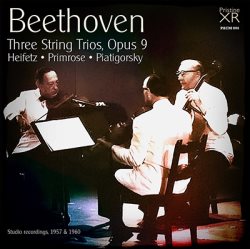| 
|
Ludwig van BEETHOVEN (1770-1827)
String Trios, Op. 9 (1798)
No. 1 in G major (1796-98) [21:04]
No. 2 in D major (1796-98) [20:49]
No. 3 in C minor (1796-98) [21:40]
Jascha Heifetz (violin); William Primrose (viola); Gregor Piatigorsky (cello)
rec. 27 March, 1957, Hollywood, USA (No.1); 17/22 August, 1960, RCA Studios, Hollywood (No.2); 29/30 March, 1957, Hollywood (No.3).
XR re-mastering, Ambient Stereo
PRISTINE AUDIO PACM094 [63:33]
Surprisingly, these recordings made by three of the most illustrious string players of the last century have never to my knowledge been issued on CD. This may be because of the unsatisfactory quality of the original recordings which, when issued as part of a 3 LP collection by RCA in 1976 , were criticised by “Gramophone” as “dry” and “hard”, with the instruments far too close to the microphone.
Pristine have certainly resolved that problem: their Ambient Stereo re-mastering has given the sound some air and space in order to create a very pleasant and acceptable listening experience of recordings now well over fifty years old.
These youthful string trios were the last Beethoven wrote, seemingly preparatory to embarking upon the extended sequence of string quartets which began with the publication of Op.18 in 1801. They bear stylistic similarities to those quartets and although they are not perhaps amongst his greatest works, upon their publication in 1799 the 28 year old composer declared them his best music thus far.
They certainly benefit from being played by the three distinguished instrumentalists here, whose secure intonation, depth of tone and ability to shade dynamics subtly are all so much in evidence. They display the requisite sense of interplay and cohesion; there is equal balance between them, no grandstanding or undue prominence from any one instrument and they communicate a real sense of pleasure and enjoyment in their music-making.
The vigour and attack of the Adagio opening of the G major trio is striking, signalling the sense of purpose and unanimity which characterises these readings. The following Allegro is remarkable for its thematic elaborations. The second movement is another Adagio but there is no lingering, rather a constant sense of forward movement almost suggestive of restlessness rather than repose. The Scherzo is light and vivacious while the concluding Presto would be rushed were it not for the dexterity of the musicians.
The fact that D major trio was recorded three years later is signalled by sound appreciably better than in the two earlier recordings which sandwich it; evidently engineer Andrew Rose had a superior master to begin with so is able to do even more with it. It is the most conservative of the three trios, its genteel stateliness identifying it as pre-1800. The players accordingly adopt a more refined and restrained manner, demonstrating their sensitivity to the demands of the prevailing mode. The Andante is full of pathos, with a marvellous poignant melody played first by the viola underpinned by pizzicato cello, then mid-way Heifetz soars on another wonderfully melancholy tune. The Menuetto is trim and precise, then the mood changes gear for the playful Rondo-Allegro.
The reversion to somewhat inferior sound for the C minor trio is immediately noticeable but the ear soon adjusts. It is the most complex and innovative of the three pieces, demanding more of the instrumentalists’ abundant virtuosity; perhaps the key is significant, giving notice of Beethoven’s seriousness of intent. He seems here to be moving into the Sturm und Drang style we recognise from his later, mature works: the passionate Scherzo and Presto finale are typically angular and surprising but the heart of the work lies in the serene Adagio, played here with the warmth and wisdom of seasoned Beethovenians.
These three trios were originally issued on two LPs, Nos. 1 and 3 together on one and No.2 coupled with three Bach Sinfonias and a Schubert Trio, so it is good to have all three on one CD.
There have been plenty of recommendable recordings of these works in more modern sound and also some classic accounts such as that by the Grumiaux Trio, but the chief attraction here is the chance to hear three now legendary musicians playing in harmony and for the first time in more than tolerable – indeed very acceptable – stereo sound.
Ralph Moore
 |
 |
|



 All Nimbus reviews
All Nimbus reviews








